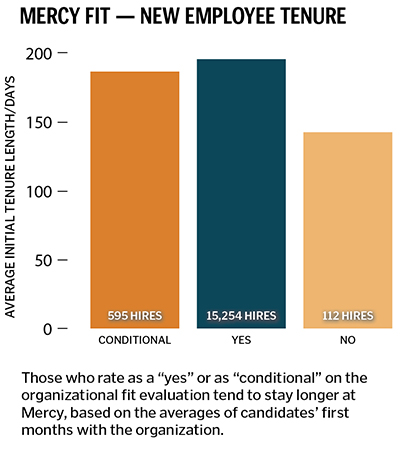TOM BUSHLACK, PhD, and TOM EDELSTEIN, MAHCM, MBA, MA
Mercy

Illustration by David Senior
At Mercy, the hiring process includes conversations and assessment to determine if candidates have qualities that will make them a good fit for the Catholic health care system. While many employers discuss the workplace culture with candidates, Mercy engages candidates in discussions specific to the system's Catholic identity.
Job candidates notice, with one commenting, "The recruiter spoke about the mission; the hiring leader talked about Mercy's values, and now I'm here speaking with a mission leader, talking about the meaning and purpose of my work as [part of] a ministry. I love that you guys care so much about your culture."
Another candidate sent an email to a mission leader following his interview, saying he hadn't fully thought of his career as a form of stewardship, until the two had a discussion: "Therefore, I thought you would appreciate knowing that you reached deep within me to help me clearly realize that important connection." The candidate said whether or not he joined Mercy, he would start to think about his work as a way to "glorify God."
Sr. Anita DeSalvo, RSM, previously a Mercy board member, explained that hiring for fit is fundamental to the ability to sustain the culture and charism of Mercy: "Through formation, we can fan the embers and stoke the fire of passion for ministry, but I don't think we can really start that fire." Hiring for fit signals to all involved — candidates, recruiters, hiring managers and mission leaders — that formation begins even as someone applies for employment with Mercy.
WHAT'S A "MERCY FIT" APPROACH?
Mercy has been conducting system-wide organizational fit assessments along with evaluations of candidates' qualifications and talent for more than 20 years. We identified some essential attributes for candidates to be successful in our ministry, such as having a kind and caring disposition toward others and an appreciation that one's work in Catholic health care is imbued with higher meaning and purpose.
The process evolved from a "you know it when you see it" discernment model to a formal system for all candidates in the hiring process. New, structured protocols were developed that included training for hiring managers and recruiters, along with online documentation to track data and outcomes. This data allow us to further refine the "Hire-for-Fit" process and develop predictive analytics of employee success, tenure, promotion and satisfaction based on initial and, in the case of potential promotion, subsequent assessments.
The impetus for this standardization was the transfer of the health ministry's sponsorship to a public juridic person, including more lay leadership, in 2008. With that transition came the responsibility to sustain Mercy as a ministry of the Catholic Church in the tradition of the Sisters of Mercy. To honor this commitment, a new objective around hiring decisions was developed in which a candidate's inclination for ministry would factor as a primary qualifying requirement.
Recruiters, hiring leaders and mission leaders are trained in what to listen for in interviews and the process of how to conduct, score and document the assessments. Interviewers ask specific questions focused on five key areas of ministry fit: understanding health care as a ministry; justice as a right relationship; common good; care for those who are poor; and service.1
Based on the candidate's response, the interviewer scores each category on a defined scale from one to five: 1 = lacking; 2 = inconsistent; 3 = satisfactory; 4 = consistent; and 5 = exemplary. Using a weighted algorithm, each candidate receives a total score, and the interviewer provides a categorical rating of "yes," "no" or "conditional" as a candidate fit for Mercy. Interviewers submit written notes on the candidate's responses in support of the scoring. These notes include suggestions for further assessment by other interviewers and for future personal formation plans, especially if the candidate is deemed "conditional."
This system allows for sharing of assessments among interviewers and for longitudinal outcomes research. Since its inception, more than 40,000 assessments have been documented with preliminary studies supporting intuitions that those who demonstrate high levels of ministry fit tend to perform better, experience higher levels of employee satisfaction and remain longer with the organization.

ASSESSMENT VALIDITY AND RELIABILITY
In 2018, Mercy partnered with Cornell University's Office for Research on Evaluation and MLC (formerly the Ministry Leadership Center) to measure the internal validity of Mercy fit-assessed categories and the defining characteristics of each. Overall, the Hire-for-Fit assessment displayed a very high degree of reliability, and subsequent studies found 80% "inter-rater reliability," which means multiple assessments of the same candidate resulted in similar conclusions among different interviewers who completed the ratings on the assessments.
We found that providing adequate training for hiring managers, recruiters and mission leaders on use of the Hire-for-Fit tool and process is essential to ensuring consistency of ratings across the ministry. This training continues through a collaborative relationship between the Mission department and the Office of Talent Excellence (human resources). Hire-for-Fit training is included as part of new leader formation programs since leaders (managers, supervisors, directors and executives) have the greatest responsibility to screen and hire employees who are most likely to thrive and contribute to our ministry's culture.
DATA FINDINGS
A small study of providers in our urgent care centers, Mercy|GoHealth, demonstrated positive correlations between Mercy fit score and key measures of performance, including: net promoter score (a customer loyalty and satisfaction score); door-to-provider time (time from when a patient arrives to first interaction with a health care provider); door-to-door time (based on when the patient is discharged); and likelihood of remaining in their position for the coming year. There is a consistent trend with the top 25% group (median Hire-for-Fit score of 68.1) outperforming the bottom 25% group (median Hire-for-Fit score of 44.4) on all four measures. This suggests the Mercy fit assessment may be associated with better performance outcomes from providers, however more data is needed for definitive conclusions.
Furthermore, an internal study was conducted of tenure among 16,000+ employees hired between January 1, 2020, and March 30, 2022. The data (see graph above) demonstrated trends that candidates who are assessed to be a Mercy fit (rated as "yes" or "conditional") are more likely to have longer initial tenures than those who were assessed as not being a fit for the ministry. (In some cases, the system does hire those who score a "no" on the assessment.) Our review also indicated that Hire-for-Fit assessments conducted by mission leaders provided the most accurate predictive data for employee tenure and retention. While these initial trends are promising, a longer-term study is necessary to determine the predictive validity of the Hire-for-Fit assessment.
HIRING FOR FIT AS A FORMATIVE EXPERIENCE
Aside from helping to predict potential employees' long-term success with Mercy, the practice of hiring for ministry fit is also a formative experience for candidates, as hiring leaders and recruiters weave this element into interview discussions. It introduces and reminds candidates of who they are called to be in their work as a ministry. While some come to the health ministry with a bit of knowledge of Mercy's culture and reputation in the community, they arrive to their interview primarily prepared to speak of their experience and qualifications. Those who we conclude are a fit for ministry frequently become more engaged as they respond to questions pertaining to the meaning they experience in their work, how they were called to this career and where they find the greatest joy. As they come to learn from the interview process that they will be working alongside others who share a higher sense of purpose, their appreciation of the culture deepens.
Recently, an instructor at a local school of nursing was interviewing for an urgent care nurse practitioner opportunity with Mercy. During her Hiring-for-Fit assessment, she shared a conversation she had with one of her graduating students, who was interviewing with Mercy and other area hospitals. When asked which hospital she decided on, the student said that during a job interview at a secular hospital, they started by talking about the job responsibilities and hours. At Mercy, she explained, they began by "wanting to make sure they understood what I was looking for and why. They wanted to know I was going to be happy doing what I love. The kindness and caring they showed made all the difference."
APPRECIATING DIVERSE BACKGROUNDS
While the Hire-for-Fit process can lead into a discussion of one's individual faith, it is important to respect the diversity of candidates and their right to maintain professional boundaries as it relates to disclosing personal information. Interviewers are trained to assure the candidate that the purpose of the interview is to assess their fit with our ministry culture, regardless of their personal spiritual or faith commitments. The same is true of those who do not identify with a faith tradition or who have chosen not to religiously affiliate as adults. It is important that the Hire-for-Fit process invites the candidate to be fully authentic and honest about their professional identity. Doing so invites both them and the interviewing team into a process of mutual discernment. The goal of the process is to assess a candidate's openness, curiosity and willingness to work in a ministry context; to integrate meaning and purpose into their work; and to serve others with dignity. Candidates from a multitude of spiritual or religious backgrounds and traditions — or those who do not identify religiously — have been identified as a good fit and have had successful careers with Mercy.
CONCLUSION
Hiring for ministry fit provides many benefits that sustain and promote organizational culture, ministry identity, mission integration, formation, employee recruitment and talent development goals. The process engages interviewers and candidates in a shared process of discernment regarding the potential coworker's fit within a distinct ministry culture. It allows the candidate to enter the workplace with "eyes wide open," knowing they are stepping into a unique environment that is infused with ministry values and expectations. Our initial data suggest that hiring for fit may lead to higher rates of retention and improved performance.
A well-designed and documented Hire-for-Fit process becomes the baseline for future formation, and establishes an appreciation for the higher meaning and purpose of employees' efforts, in addition to helping to assess a path for future career growth. The process honors the trust of the Catholic Church and the founding religious order(s), ensuring that all colleagues recognize that the work of ministry continues today as a lay ministry for which they assume responsibility.
One of the surprising benefits of our experience doing Hire-for-Fit interviews for more than two decades is that new coworkers who are hired for ministry fit recognize these same qualities and characteristics in their colleagues. We have found that this process reinforces the ministry culture in a virtuous cycle, and through doing so, ensures our identity as a Catholic health care ministry.
TOM BUSHLACK is vice president of mission and formation for Mercy in St. Louis. TOM EDELSTEIN is vice president of mission for Mercy in St. Louis.
NOTE
- The original assessment included a sixth category called "Catholic worldview." After conducting an exploratory factor analysis, it was determined that this area is already reflected in responses received in the other five categories. Catholic worldview was therefore dropped from the assessment tool.